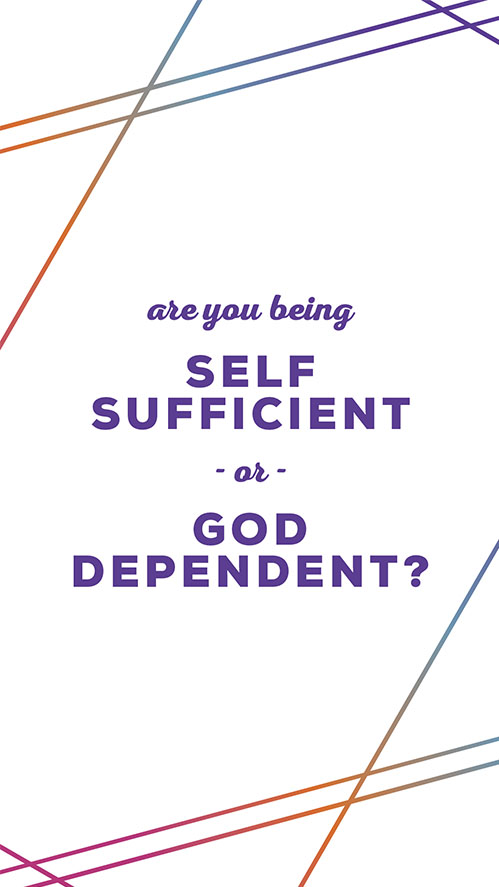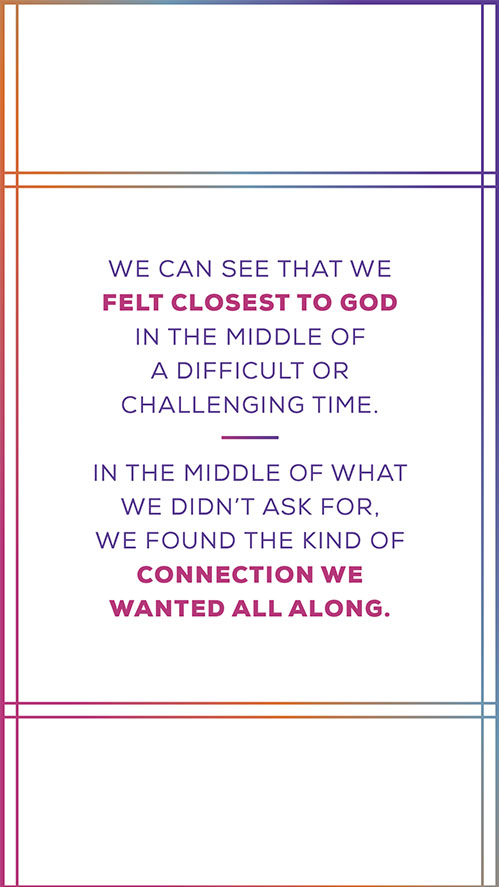
Modern technology has removed the need for most of us to stop and ask for directions. In fact, one of the many unintended consequences of our relationship to technology is that we’ve become more self-sufficient. Why need to ask for help when you can ask Siri, Alexa, or Waze?
I hadn’t thought about this until I watched a stand-up comedian make fun of how we used to trust people we never knew with our safety and future when we were lost. I understand why we prefer typing a location into a phone over asking the person who just sold us some beef jerky. That feels way too vulnerable to me!
However, it’s one thing not to need to trust the wisdom of a random stranger anymore. It’s quite another thing to see this self-sufficiency invade your relationship with God. For many of us, I think we’re far too self-sufficient.
When we’ve become overly self-sufficient in our relationship with God, it can take a crisis to lead us back into dependence.
One of the best examples of this in the Bible is the story of Elijah in 1 Kings 17. After Elijah prophesies a long drought to King Ahab, he flees to the Kerith Ravine. In this ravine, Elijah becomes dependent on God like he’s never been before that point in time. Here’s what God said to Elijah.
“‘Go to the east and hide by Kerith Brook, near where it enters the Jordan River. Drink from the brook and eat what the ravens bring you, for I have commanded them to bring you food.’ So Elijah did as the Lord told him and camped beside Kerith Brook, east of the Jordan. The ravens brought him bread and meat each morning and evening, and he drank from the brook.”
We don’t know if Elijah was self-sufficient before this time in his life, but he certainly became dependent on God during this time. Elijah was not in control of the water flowing in the brook or the ravens bringing him food; God was in control of these things. Yet, we see Elijah learn to trust and depend on God for that he could not produce himself.
One thing God has done in my life during the time our family has spent at home is challenged me with the question, “Scott, are you being self-sufficient, or are you being dependent on me?” I feel like God has posed this question to me during “normal life” before COVID-19, but it certainly became more real during this time.

The image I have of how I tend to prefer my life and relationship with God is Costco. I love Costco. I love the free samples, the cheap food after I check out, and the massive quantities of my favorite items. I do my best to visit Costco every 3-4 weeks and stock up, so I’m not tempted to go back too often.
As God was challenging me with this concept of self-sufficiency, I stumbled on a tweet from a pastor from Brooklyn, New York named Rich Villodas. Rich wrote, “Jesus calls us to pray for daily bread, but we’d rather have a Costco relationship with God. We’d rather have stuff in bulk so as to not have to come back to God so often. But we cannot live without daily dependence.”
That day, as I read that tweet, God used Rich to challenge me. “Do you look at me like you look at Costco? Get what you need in bulk, stock up, and then pull from your supply over the next 3-4 weeks, only coming back when you’re no longer able to provide for yourself?”
In an instant, I went from loving Costco to hating Costco. All too often, I want a Costco-type relationship with God rather than a daily-relationship with God. I want times of connection followed by long times of self-sufficiency.
The problem is crisis, adversity, storms, and wilderness seasons like Elijah experienced (and like many of us are in the middle of right now) are impossible to navigate with a Costco-type mentality. When you’re overwhelmed and scared, life drives you to a daily dependence on God.
That’s why when we look back on our past, we can see that we felt closest to God in the middle of a difficult or challenging time. In the middle of what we didn’t ask for, we found the kind of connection we wanted all along.

When he taught his disciples to pray, Jesus modeled these words, “Give us today the food we need.” Jesus didn’t say, “Give us today the food we’ll need for the next few weeks.” If Jesus had modeled that prayer, his disciples would’ve started down the path to Costco, seeking Him less frequently and less desperately.
But, Jesus modeled a prayer of desperation and dependence. What if the outcome of this challenging season in our lives was that we stopped relating to God like Costco, and we started coming to Him daily for nourishment?
So, the next time you stop by Costco to stock up on toilet paper, muffins, or bacon, take the opportunity to ask yourself, “Am I looking to God for a bulk supply or daily bread?”
If you’d like help with a practice that fuels a spirit of daily dependence on God through reading the Bible and prayer, check out this free resource.
Scott Savage is a pastor and a writer who believes he has the best last name ever. He leads Cornerstone Church in Prescott, Arizona. Scott is married to Dani and they are the parents of three “little savages.” He is the creator of the Free to Forgive course and you can read more of his writing at scottsavagelive.com.





